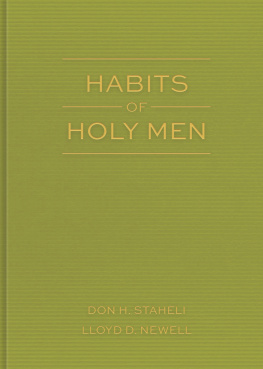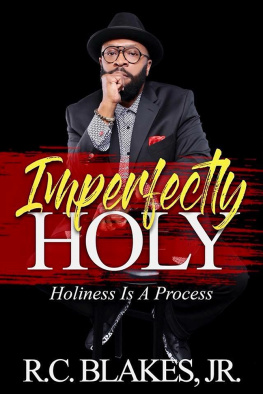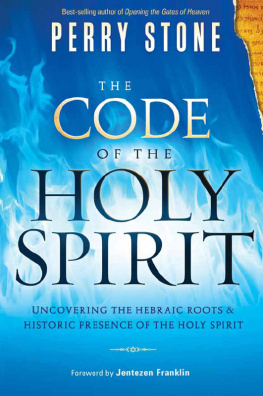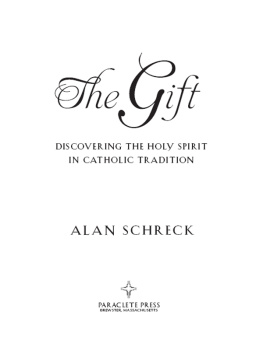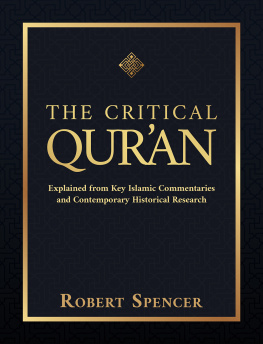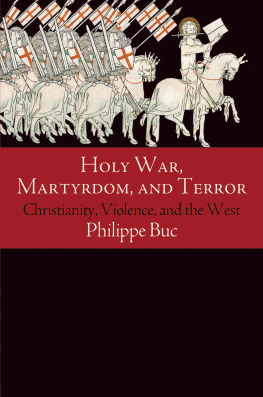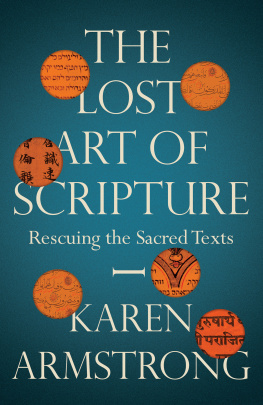Copyright 2018 by Princeton University Press
Published by Princeton University Press,
41 William Street, Princeton, New Jersey 08540
In the United Kingdom: Princeton University Press,
6 Oxford Street, Woodstock, Oxfordshire OX20 1TR
press.princeton.edu
Jacket art: Yoram Raanan, Mount Sinai II / Raanan Art, Ltd.
All Rights Reserved
ISBN 978-0-691-17423-5
Library of Congress Control Number: 2017963020
British Library Cataloging-in-Publication Data is available
This book has been composed in Miller
Printed on acid-free paper.
Printed in the United States of America
10 9 8 7 6 5 4 3 2 1
INTRODUCTION
WHAT IS HOLINESS? How is it related to morality? How is it implicated in that breakdown of morality that we call violence? These three questions motivate this book.
We are used to thinking of holiness as intimately related to morality. A holy person, say, Mother Teresa, is distinguished by her moral excellenceher compassion, her self-sacrifice, her humane beliefs and persistent dedication to human betterment. As moderns, we are comfortable with the idea that holiness maps onto goodness. But what then are we to make of holy places or times? Of holy objects? These do not seem to have anything to do with morality. Indeed, the power of holy placesfor example, the Temple Mount in Jerusalemcan motivate people to do immoral things. A Jewish underground in the 1980s plotted to blow up the Dome of the Rock so as to spark an apocalyptic war after which the Third Temple would be built and the messianic age would begin. An intense fixation on the holy can lead to ethical derangement. How then can we parse the distinctions between holiness and morality, as well as keep them both conceptually and normatively integrated? This is a philosophical task. In this book, we will use the resources of Jewish philosophy to answer these questions.
Lest these issues seem overly abstract, readers should keep in mind that they are meant to facilitate an analysis of religious violence in Judaism. What do I mean by violence? As in the earlier example, our concern is with violence motivated by religious belief, by convictions held to be so compelling that they give license to actions that override conventional morality. Examples include the murder, by Dr. Baruch Goldstein, of twenty-nine Muslim worshippers in the Cave of the Patriarchs in Hebron, before he was beaten to death, in 1994, and the assassination, by Yigal Amir, of Prime Minister Yitzhak Rabin in 1995. Goldstein was inspired by the extremist Rabbi Meir Kahane, who believed that in order for the holy people (the Jews) to achieve redemption in the holy land (Israel), the unholy (Arabs) had to be banished. Kahanes was a wrathful God who required vengeful measures. Amir came to believe, with indirect support from the preaching of militant rabbis, that Rabin was a rodef (in Jewish law, a pursuer intent on murder who could be killed to defend the innocent from his depredations). In these cases, imagined religious duty mixes with political beliefs, subordinating ethical constraints for higher purposes. This kind of violence has a political context. Religious violence, of course, can be more diffuse. It can pervade daily life, oppressing women, children, or sexual (and other) minorities in the name of some allegedly God-given holy way. Although I am not directly concerned with such phenomena here, they have a common source in misguided construals of the holy and, further upstream, in theological misprisions of God.
Of course, many books have been written, especially since 9/11, about terror in the name of God or terror in the mind of God. This has become a burgeoning field for scholars of religion, political scientists, journalists, and others. Fine books exist on violence in Jewish thought. The present book uses some of this scholarship but departs from it as well. As a work of Jewish philosophy, its contribution is neither historical nor sociological, but normative and constructive. I want to argue for a concept of holiness in Judaism that is true to its biblical rootsthat is not simply reducible to moral categories but that is nonetheless allied with morality. I want to argue for a concept of God that has been purged of violence. This book therefore works in the idioms of philosophical theology and ethics. Its emphasis is more on the critique of religious violence than on its description. To do so, I advance an original theory of holiness, a natural history of holiness, and explore the connections among holiness, ethics, and violence in light of the theory.
Part of what motivates this inquiry is a confrontation with some highly problematic texts. The Bible sometimes presents God as wrathful. It also enjoins violent conduct toward perceived enemies, such as the Canaanite nations that occupy the land promised to the Israelites. These texts raise fundamental problems about holiness, ethics, and violence. The biblical characters themselves seem to struggle with them. King Saul, for example, balks at the seeming irrationality of Gods command to obliterate the livestock along with the people of Amalek (I Samuel, chapter 15). He loses his kingship for following his own judgment, which falls short of the prescribed genocide. Such texts invite philosophical reflection on how the presumed goodness and justice of God can be reconciled with the cruelty of his commands. Why should a holy will fail at times to be a moral one? Far from a parochial project, the philosophical idiom opens up this hermeneutic reflection to readers of all religions or of none. The subject matter is primarily Jewish, but the problem of a gap between contemporary moral beliefs and ancient religious ones is universal.
The gap between moral beliefs and religious ones, however, is not a problem just for moderns. The ancients felt it, too. Bridging the gap involves a struggle to purge immoral elements from the concept of God, disallowing the concept to serve as a warrant for unworthy behavior. Socrates works on a version of this problem in Platos Euthyphro. In that dialogue, Socrates encounters a young man, Euthyphro, who believes himself to be expert in matters of holiness. Holiness or piety, hosion, refers to what the gods prescribe for or permit human The gods want human beings, for example, to do justicethat is part of holiness or piety. Indeed, Euthyphro, out of a fanatical devotion to what he understands justice and the divine will to be, is in the midst of bringing an indictment against his own father, whom he holds accountable for the murder of an underling. Socrates, and everyone else, thinks that this is madness. In Socratess Athens, a lawsuit against a murderer was brought by the family of the victim. Here, Euthyphro is taking the victims side against his own family. He believes that such extreme devotion to justice is what holiness or piety demands. After all, Zeusthe most just of the godsimprisoned his own father, Kronos, who had in turn, castrated his own father, Ouranos. Euthyphro holds to a version of


